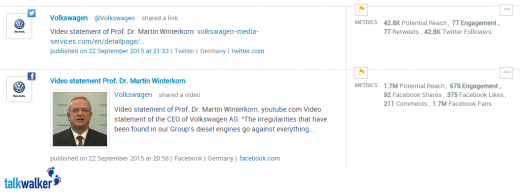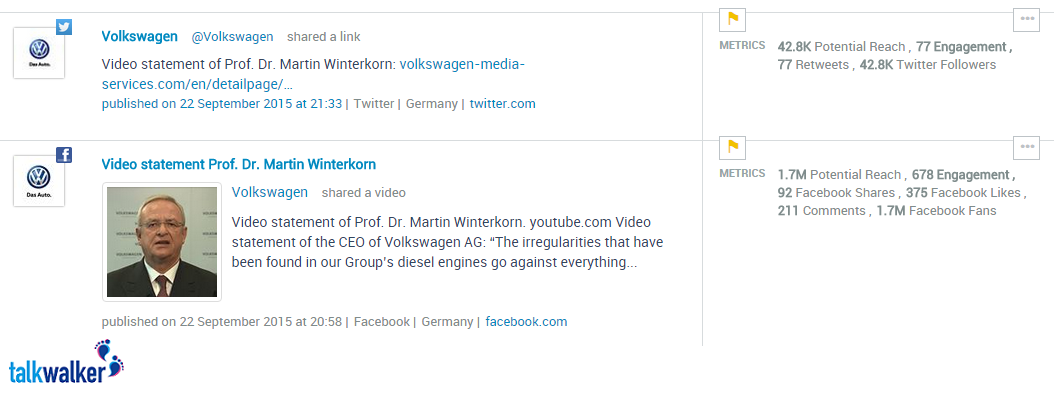Once Upon A Crisis At Volkswagen
September 24, 2015

Breakdown of a crisis: the 4 questions you need to ask yourself and how social media analytics help at each stage of the crisis management. For this article, all the data was pulled using the Talkwalker social intelligence tool.
1. Should I worry?
So you have a social listening system that is showing you the latest mentions of your brand in real-time. You even have a series of social media analytics related to each mention: sentiment, reach, engagement, author, place of publication, some information about the author.
While this is a great start to building a solid online reputation monitoring system to detect early-warning signs of potential crises as described in the “pre-crisis” phase of crisis management, once you start seeing negative articles flowing on the web about you, it’s a matter of knowing how to react, in an orderly fashion. First of all, you will need to:
– Understand the cause of the negativity and how legitimate or erroneous that information is;
– Understand the intensity of the crisis and how much it has spread and where exactly in the vast expanse of the social web.
Looking at the volume of mentions for both the Volkswagen scandal and Volkswagen CEO Martin Winterkorn, we discover the cause of negativity (widely known by now, and confirmed by this theme cloud) to be about Volkswagen’s violation of the Clean Air Act exposed by The Environmental Protection Agency.

Top themes around Volkswagen as detected by social media analytics tool Talkwalker
It’s been everywhere in the news. We’ve all read stories about Volkswagen, its software to fool regulators, and unforeseen developments worthy of a Hollywood scriptwriter. In this case avoiding all negativity is going to be impossible but a more attainable goal would be to prevent sustained levels of negative buzz, and to decrease the level of negativity in the reaction from the community. In Volkswagen’s case, the peak of the attention on social media happened on Sep 23rd, 2015 at 5pm CET following the news about Martin Winterkorn’s resignation as CEO of the group. Since then, the volume of mentions decreased back to an average of 2,000 mentions per day, 10 times less than during the peak.

Among the 259,100 social mentions picked up by Talkwalker in just 4 days, the peak of nearly 20,000 mentions happened on the third day and the active sources are Twitter, online news, newspapers, and blogs by volume.

A social media world map will give you immediate insight into the volume and sentiment of mentions across the globe
Additionally, it’s interesting that despite the Volkswagen brand having taken a big reputational hint, they may feel some relief at the fact that this crisis hasn’t had a major impact on their other brands from a reputation standpoint, as shown on the following graph for Audi, Lamborghini, Bentley, Bugatti, Skoda and Ducati.

The anatomy of your crisis should be well understood before you move to the next step, which consists in taking the right actions.
2. Should I respond?
The answer is: yes. But we are not always dealing with a one-time complaint on Twitter. If your case is serious and is making a substantial impact, you’d better have a plan in place and execute it in a timely manner. As Sofie de Beule recommended on Social Media Examiner: “Come up with a variety of scenarios, so you can take control of any situation when the time comes […]. Additionally, create a social media committee that involves people from the entire company and meets on a regular basis”. Arm yourself with a team of community managers who will know exactly how and what to answer to individual complaints and criticisms. For example, the Volkswagen community management team spread the official communication from their CEO to a series of complains found on Facebook and Twitter.

Example of community management action taken during the crisis by Volkswagen official Facebook pages
3. Should I take further actions?
Bad buzz can come to a point where it’s almost not viable to answer each and every criticism published on the web. An official press release or communication is a useful way to defuse a tense situation (see real-life examples of how Buffer, Fontaine Santé, or J.C. Penney responded in a crisis situation). When the gravity of the situation needs an immediate solution that goes far beyond reputation management techniques, a necessary corporate action needs to be taken. Winterkorn’s resignation made an impact that is clearly shown in the following graphs.
As stated previously, it’s essential to reduce negativity in order to avoid a snowball effect, as a bad reputation can have a financial impact on your stock price.

Volkswagen’s stock price evolution in the past month. Source: Google Finance
Absolute figures clearly show a large majority of negative mentions about Volkswagen:

More interesting is the evolution of sentiment towards your company and your brand. Since Winterkorn’s resignation, social media buzz has dropped and negativity has decreased. Spike analysis for sentiment over last four days looks like this:

Negative results linked to Volkswagen have decreased since Winterkorn’s resignation, which triggered a buzz peak
4. How can I mend a broken reputation?
Taking full responsibility for the issue is the first step that will make the media more open to listen to what you have to say on behalf of a company. This is exactly what Volkswagen’s ex-CEO did when he issued a filmed apology for cheating emissions test, which was shared through the company’s official YouTube channel almost immediately after the story broke, and on their social channels.

The second step consists in maintaining and making the corporate values known, implying there is a strong value mission and quality of service/product that will carry on after this “hiccup”. Working at the heart of the deep, underlying issue and making any changes known in a “Crisis FAQ or message board” will have people focus on how you are working on your problem and gather their complaints in one single place at the same time. It’s all a matter of taking back control of your reputation !
Do you have any other tips for crisis management? Would you have wanted Volkswagen to react in a different way? Come back regularly to our social media analytics page dedicated to Volkswagen for an updated status of the company’s brand health, or monitor any other company’s potential warning signs on Talkwalker’s Crisis Management IQ App.
Photo Credits: Business Finance News
Digital & Social Articles on Business 2 Community
(153)



